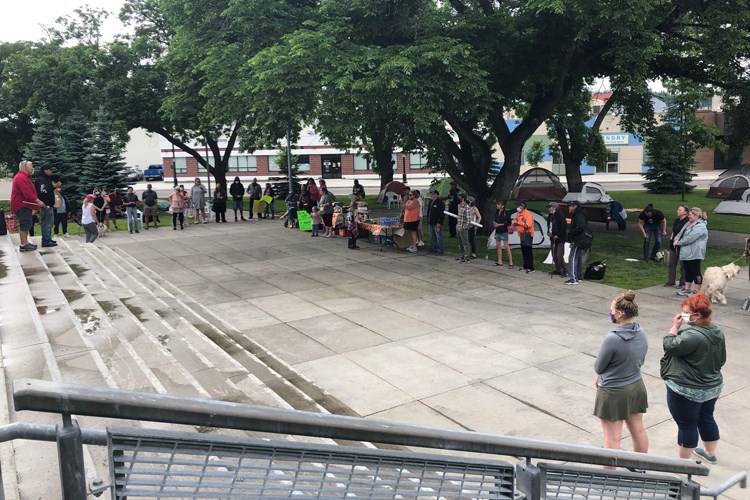Roughly 60 people gathered outside city hall on Monday night to voice their opposition to the eviction of a homeless camp on George Street and proposed bylaw changes that would allow the city to ticket people for panhandling, open drug use and camping in public areas.
Tents were set up on the lawn of city hall, and members of the Together We Stand group planned to camp out overnight to show their support for the homeless. Group member Amelia Merrick said she's concerned as a citizen of Prince George about how the city treats its most vulnerable citizens
"I want to live in a society where we have respect for people regardless if they are homeless or precariously housed," Merrick said. "These proposed bylaws just further criminalize the poor."
City council was expected to debate the proposed Safe Streets Bylaw on Monday night. The bylaw would empower bylaw officers to issue $100 tickets, with a $75 penalty for late payment, for a variety of "nuisance" behaviour. In addition, city council is being asked to approve, in principle, an amendment to the Parks and Open Spaces Bylaw to allow homeless people to temporarily camp in designated areas, when shelters in the city are full.
On Thursday, the city announced it intends to seek an injunction to evict homeless people camping on a vacant lot on George Street across from the court house.
"Where are they supposed to go? There has to be a plan in place," Merrick said. "They have no place to go, and they are getting angry."
In a statement issued prior to Monday's rally, Together We Stand called on city council to reject the proposed Safe Streets Bylaw and other bylaw amendments.
"Proposed amendments to bylaws No. 7370, 2002 and No. 9211, 2021 increase chaos to homeless and precariously-housed persons and the social service agencies who support them," the statement said. "These amendments are harmful to people, unhelpful for Indigenous organizations, non-profits and social service agencies, damaging to businesses and expensive."
The group called on the city to develop an emergency shelter plan that meets people's needs and treats them with dignity. Until sufficient low-barrier shelters are built, the city should provide a secure place where people can camp, store their belongings and access basic washroom facilities.
"(Although) Northern Health has the highest overdose death rate in the province, there are no shelters appropriate for unhoused people with substance use disorder," the statement said. "When drug users are forced or coerced into shelters without overdose prevention services they may hide drug use or go into withdrawal, increasing overdose death risk."
The group called on the city have a housing-first plan in place by Jan. 2, 2022, when the Lheidli T’enneh flag is raised again. The city announced the flag would fly at half-mast for 215 days to honour the 215 children whose bodies were found in an unmarked grave near the site of the former Kamloops Indian Residential School.
"Homeless individuals are exhausted from being misplaced on a daily basis and inappropriate shelter puts people at higher risk of overdose death," the statement said. "Prince George does not have an adequate supply of appropriate shelter which considers the unique needs of individuals, including the need for longer-term stay including day times use, the need to store belongings, and the need to be accommodated with partners or pets. Appropriate shelter also recognizes that sobriety should not be a condition for shelter."
The group also called on the city to engage with the homeless and precariously-housed, and ensure they are part of creating the solutions, and for the city to increase support for social service agencies, especially Indigenous agencies.
While the report going before city council identified the increase in calls for service to clean up needles, human waste, camping debris, etc., it didn't consider the impact the COVID-19 pandemic has had on social service agencies, the group said.
"(Seventy-five per cent) of non-profits in the Fraser-Fort George (Regional District) cancelled, reduced or changed in-person programming," the statement said. "It should come as no surprise that we are seeing an increase in loitering, open drug use, tenting and increased (calls for service). There is literally no indoor space for people to go."
An online petition launched by the group on had received 50 signatures as of Monday at 4:30 p.m.


